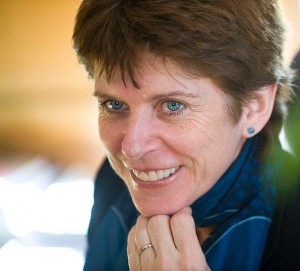Judging the Walter Scott Prize
by Lucinda Byatt
Professor Louise Richardson talks to Lucinda Byatt
It is not very usual for literary prizes to include academics on their judging panels. Professor Louise Richardson, the Principal of St Andrews University – now in its 600th year – is a leading political scientist, specialising in international security with an emphasis on terrorist movements. I asked her why she had joined the judging panel for this prestigious prize.
LR: I am a consumer of historical fiction. I read fiction to keep myself sane, it’s how I relax. I read a lot of historical fiction as a child and largely for this reason decided to read History at University. So, I accepted the invitation to serve as a judge because as I saw it as an excuse to make time to read fiction without feeling guilty about it.
LB: The books shortlisted for this Prize must be set (for the most part) “60 years hence”. Do you think that the current vogue for historical fiction can be partly attributed to the fact that readers appreciate its ability to shed light on the present?
LR: No, not really. I’m inclined to think it is driven more by curiosity about the past and a desire to learn about it while being entertained.
LB: Do you think that the Prize should also be extended to any historical fiction in English, including works in translation?
LR: In principle, of course, it would be fabulous to extend the prize to any historical fiction in English as great literature has always transcended national boundaries. As a practical manner, however, it might be difficult to manage. That said I expect this subject to engage the judging panel in the years to come.
LB: Sebastian Barry’s novel On Canaan’s Side was the prize-winner. Could you comment on the choice?
LR: I found Lilly Dunne’s voice to be completely authentic, compelling and deeply moving. She joins Colm Toibin’s Eilis Lacey as an incisive chronicler of the life of a young Irish immigrant girl.
The life of the first generation immigrant, especially in the US where the social network is not nearly as strong as in European social democracies, is usually a very tough one. It’s more often subsequent generations who achieve the financial security to which their predecessors aspired.
LB: Do you object to the idea that historical fiction is sometimes included on course reading lists?
LR: I do worry about this. In my courses I always assign fiction and films as a way of trying to help my students understand the motives and worldview of terrorists and the societies that support them. For example, I assigned Camus’s Les Justes in the first week of my large undergraduate lecture course. While fiction can help with an understanding of broader themes, I worry that historical accuracy can get lost if fiction becomes a substitute for, rather than a supplement to, academic work.
One would hope that seeing the film Gandhi or Michael Collins or reading Andrew Miller’s novel Pure would cause a student to want to study the Irish or Indian Independence movements and the French Revolution. I would hate to think that having seen the film or read the book they would feel they didn’t need to.
LB: What is your favourite historical novel?
LR: It is very, very hard to choose a favourite historical novel but I do know that Sebastian Barry’s A Long Long Way would be up there among my handful of favourites. It movingly explores the whole question of identity in such a memorable way, and it gives a voice to a forgotten segment of Irish history, those ordinary people who remained loyal to England, and found themselves on the wrong side of history. The depiction of the horrors of the First World War and the survival of individual humanity in the midst of the massive humanitarian catastrophe haunted me for a long time afterwards.
Further details about the books and authors can be found at www.bordersbookfestival.org
The Historical Novel Society has also reviewed all the shortlisted books: https://historicalnovelsociety.org/walter-scott-prize-shortlist-2012-who-should-win/.
______________________________________________
Published in Historical Novels Review | Issue 61, August 2012







